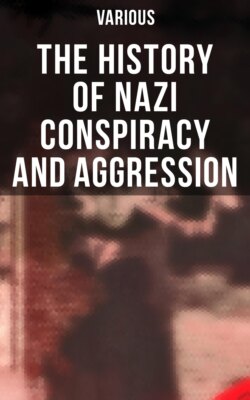Читать книгу The History of Nazi Conspiracy and Aggression - Various - Страница 86
На сайте Литреса книга снята с продажи.
4. ERNST KALTENBRUNNER
ОглавлениеTable of Contents
On 18 November 1945, two days before the opening of the trial, Kaltenbrunner suffered a spontaneous subarachanoid hemorrhage and was taken to the hospital for treatment. He remained there until 6 December, when he was returned to the jail. He attended the 10 December session of the Tribunal and was in court for several days thereafter, but his condition deteriorated so that it was necessary to return him to the hospital for further treatment. Medical opinion expects at this writing (23 January), that he will be required to remain under hospital care for a considerable period.
On 2 January Kaltenbrunner’s counsel, Dr. Kauffmann, requested the Tribunal to postpone the case against his client because of his illness. The Tribunal ruled (1) that the prosecution should proceed with any evidence which it proposed to direct against the criminality of organizations with which Kaltenbrunner was connected, (2) that any prosecution evidence directed against Kaltenbrunner as an individual should be withheld until the prosecution reached that part of its case in which it had planned to trace the responsibility of individual defendants, and (3) that Kaltenbrunner’s case should properly be left until the end of this section of the evidence. If at that time the defendant should be still unable to be present in court, the Tribunal ruled that “the evidence will have to be given in his absence.”
A closed session followed at which the Tribunal heard both the prosecution and defense counsel, as a result of which the Tribunal modified its ruling. Since the prosecution’s evidence was so inextricably mingled that it was impossible to divide it between that which bore against Kaltenbrunner as an individual and that which bore against the organizations which he headed, the Tribunal ruled that it would hear the prosecution’s evidence in its entirety. Counsel for Kaltenbrunner, however, was given the privilege of cross-examining at a later date any witnesses which the prosecution might call against Kaltenbrunner. The Tribunal pointed out that defense counsel would also, of course, have an opportunity to deal with any documentary evidence against Kaltenbrunner when the time came for the presentation of the defense case.
